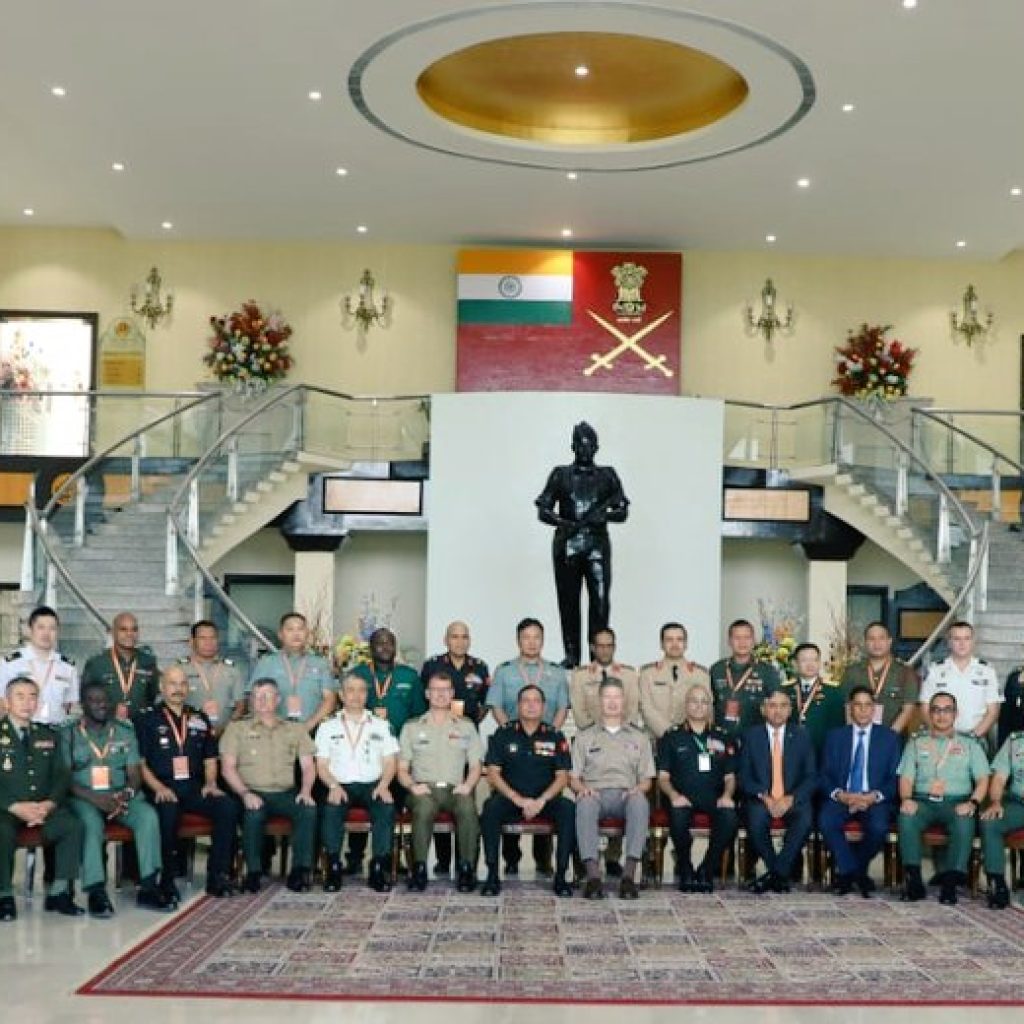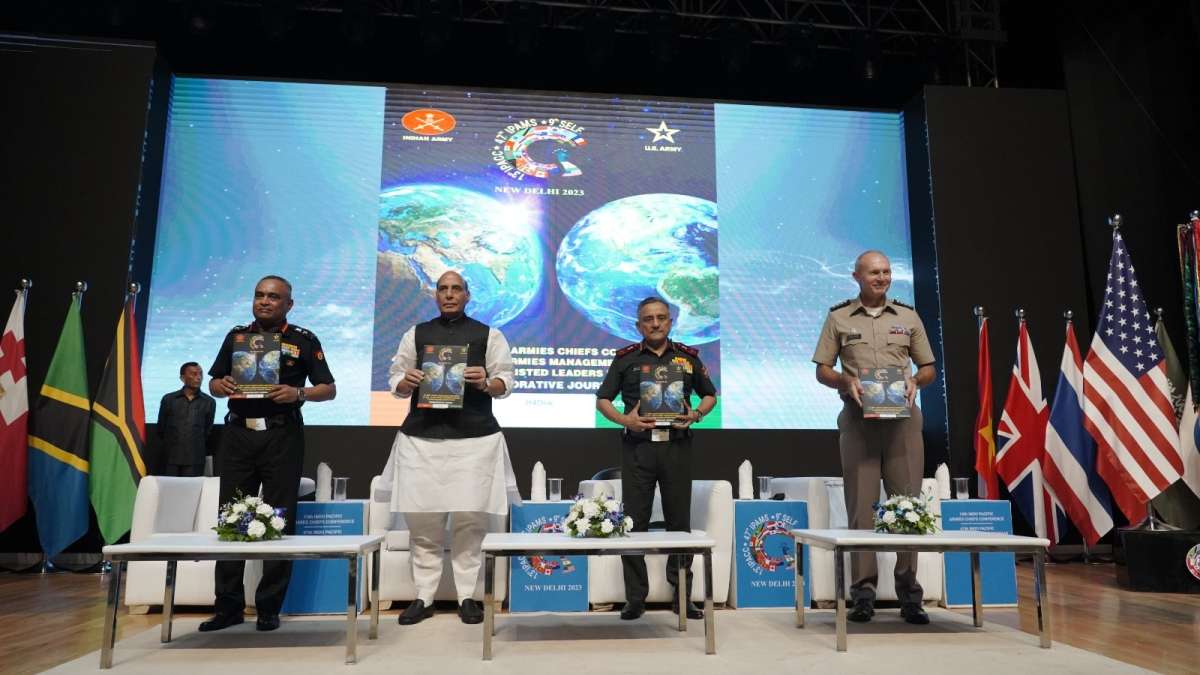The three-day event took place in the backdrop of increased muscle flexing by China in the Indo-Pacific region…reports Asian Lite News
The Indo-Pacific Armies Chiefs Conference (IPACC) organised by the Indian army with the US Army as the co-host concluded on Wednesday with the 30 participating countries agreeing “to work towards a collaborative effort to address the challenges faced in the region.”
The three-day event took place in the backdrop of increased muscle flexing by China in the Indo-Pacific region.
‘The Army Chiefs and Heads of Delegations had free and frank discussions on the need for an open and inclusive Indo-Pacific region that follows a rules based world order. They highlighted that Indo-Pacific has diversity at many levels and all agreed to work towards a collaborative effort to address the challenges faced in the region,’’ according to an official statement issued on Wednesday.
The event achieved the envisaged outcomes such as evolving a shared vision for military cooperation, fostering a sense of collective responsibility, sharing best practices, appreciating areas and communities vulnerable to climate change, synergising approach to disaster relief, increasing military exchange endeavours, progressing defence diplomacy initiatives and reinforcing the importance of open and sustained dialogue to jointly address issues that impact the Indo-Pacific countries, the statement added.
The event provided an opportunity for the delegates to exchange ideas and views on security and other contemporary issues of mutual interest, with core efforts directed to promote ‘peace and stability’ in the Indo-Pacific region.
The event commenced with a call-on by General Randy George, the Chief of Staff of the US Army, to General Manoj Pande, Chief of the Army Staff, Indian Army, on September 25. Both Chiefs discussed issues of mutual interest and shared views on contemporary issues.
General Pande also held bilateral meetings with chiefs of the armies of the participating countries. These included one-to-one discussions with General Morishita Yasunori (Japan), Lieutenant General Simon Stuart (Australia), Lieutenant General Mguyen Doan Anh (Vietnam), Major General John Boswell (New Zealand) and General Sir Patrick Sanders (UK).
Sessions of the Indo-Pacific armies management seminar (IPAMS) were conducted in the plenary sessions on three themes.
The first theme was “Partnering for Sustainable Peace and Security in the Indo-Pacific”. Second theme was “Cooperation to Enhance Interoperability” and the final theme was “Humanitarian Assistance and Disaster Relief (HADR)- Evolving Mechanisms for Crises Response”.
It emerged during the discussions that the nations need to work together to strengthen the collective responses. This collaborative effort is not built overnight and therefore IPAMS provided the platform to build a connect, confidence and commitment for the future, the official statement said.
The senior enlisted leaders forum (SELF) was conducted in three sessions on the themes, “Interoperability Amongst Indo-Pacific Armies”, “Grooming Junior Leaders for Modern Battlefield” and “Beyond the Barracks- Addressing Senior Enlisted Leaders’ Concerns”. It was a unique forum where junior leaders at the functional level exchanged their views and ideas.
The event culminated with the closing ceremony at the Manekshaw Centre in Delhi on Wednesday.
The conference came to an end with a flag handing over ceremony, as IPACC and IPAMS flags were handed over by the Indian Army to the US Army.

Gen Pande Underlines Complexities in Indo-Pacific
The Indo-Pacific region is not only a cauldron of cultures, histories, resources and opportunities but also a theatre of complexities and challenges, Chief of Army Staff (COAS) General Manoj Pande said during Indo-Pacific Armies Chiefs Conference (IPACC) that culminated here on Wednesday.
The three-day long event — IPACC, Indo-Pacific Armies Management Seminar (IPAMS), Senior Enlisted Leaders Forum (SELF) — was organised by the Indian Army with the US Army as the co-host. The event witnessed participation from 30 countries.
US Army Chief of Staff Gen. Randy George highlighted the role of land power and said that it not only contributes to the shared security of the region but land power is also the decisive force in dealing with crises.
As many as 18 countries were represented by Chiefs of their respective Armies and 12 countries were represented by heads of delegations.
Defence Minister Rajnath Singh delivered the inaugural address while the closing address was delivered by Minister of State for Defence Ajay Bhatt.
According to Defence Ministry, the event provided an opportunity for the delegates to exchange ideas and views on security and other contemporary issues of mutual interest, with core efforts directed to promote ‘Peace and Stability’ in the Indo-Pacific region.
As part of 13th IPACC, a Chief’s Round Table Conference was held on the theme “Together for Peace: Sustaining Peace and Stability in the Indo-Pacific Region”. All Chiefs echoed the theme and reflected the sentiments of all the nations in the area, a Defence Ministry official said.
The COAS also held bilateral meetings with Chiefs of the armies of the participating countries.
Sessions of 47th IPAMS were conducted in the plenary sessions on three themes. The first theme was “Partnering for Sustainable Peace and Security in the Indo-Pacific”; second theme was “Cooperation to Enhance Interoperability”; and final theme was “Humanitarian Assistance and Disaster Relief (HADR) – Evolving Mechanisms for Crises Response”.
A special plenary for the spouses was also conducted on the theme “Beyond the Barracks: Roles and Challenges in Fostering Military Communities and Sharing Best Practices”. The session commenced with the opening address by Archana Pande, President, Army Wives Welfare Association (AWWA) and Patty George, spouse of the COS of the US Army.
The spouses also visited the National War Memorial and paid their tributes.

Leave a Reply